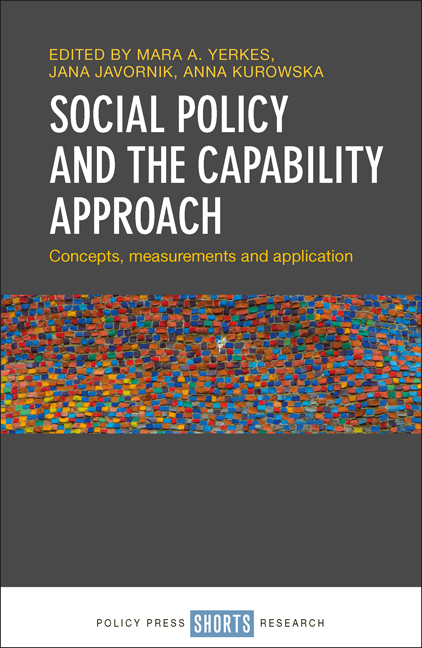Book contents
- Frontmatter
- Contents
- List of figures and tables
- Notes on the editors
- Notes on contributors
- one Rethinking social policy from a capability perspective
- two Education as investment? A comparison of the capability and social investment approaches to education policy
- three From ‘active’ to ‘capable’: a capability framework for policy and practice on ageing and later life
- four Converting shared parental leave into shared parenting: the role of employers and use of litigation by employees in the UK
- five Comparative social policy analysis of parental leave policies through the lens of the capability approach
- six Ask rather than assume: the capability approach in the practitioner setting
- seven Social investment, human rights and capabilities in practice: the case study of family homelessness in Dublin
- eight From the capability approach to capability-based social policy
- Index
four - Converting shared parental leave into shared parenting: the role of employers and use of litigation by employees in the UK
Published online by Cambridge University Press: 30 April 2022
- Frontmatter
- Contents
- List of figures and tables
- Notes on the editors
- Notes on contributors
- one Rethinking social policy from a capability perspective
- two Education as investment? A comparison of the capability and social investment approaches to education policy
- three From ‘active’ to ‘capable’: a capability framework for policy and practice on ageing and later life
- four Converting shared parental leave into shared parenting: the role of employers and use of litigation by employees in the UK
- five Comparative social policy analysis of parental leave policies through the lens of the capability approach
- six Ask rather than assume: the capability approach in the practitioner setting
- seven Social investment, human rights and capabilities in practice: the case study of family homelessness in Dublin
- eight From the capability approach to capability-based social policy
- Index
Summary
Introduction
Fathers need to have the space to think about what kind of a dad they want to be. Not all fathers will need or want to work flexibly or take shared parental leave, but many will. It's important that the families talk about their vision together and do what works for them. And whatever they decide, the options and choices need to be available for them in the workplace, that's the key. (Elliott Rae)
Gender inequality in paid work and care has been a persistent social problem in the UK, despite the adoption of gender equality policies since the 1970s. In this one-and-a-half earner model, women leave the labour market or work part-time after childbirth and take on higher parenting and care responsibilities than men (Lewis, 2009). To challenge traditional gender division of labour and to remove historic workplace inequality between women and men, the UK government introduced Shared Parental Leave (SPL) in 2014 (with effect from April 2015). Its intrinsic aim was to expand parents’ capabilities to share parenting, by affording fathers similar entitlements to post-birth leave as mothers. Policy sought to simultaneously address other sources of gender inequality such as attitudes among men and women which make women the primary parent, responsible for family (Robeyns, 2006). This would expand parents’ capability sets to remain in work after childbirth and to share parenting differently. Such social policy developments are prima facie positive and represent a major step forward in addressing gender inequality at home and at work. However, the UK's SPL policy has not produced the desired change in fathers’ leave uptake and the implementation has exposed several issues.
While the literature on the SPL is booming, it is still far from clear what its implications are. Earlier studies suggest that the failure of this new policy is an inevitable outcome of the low statutory pay attached to it (Javornik and Oliver, 2015; Baird and O’Brien, 2015; Mitchell, 2015; Atkinson, 2017). The UK's (and Ireland’s) statutory maternity pay offers the lowest replacement rates in the OECD, of around one third of gross average earnings (OECD, 2017) and Shared Parental Pay (SPP) adopts the same basic rate. We argue that research has overlooked the complexity of the UK's social policy landscape, in which employers can topup government payments by offering extra-statutory (enhanced) benefits (for example, sickness, maternity, paternity and SPP) through their contractual terms.
- Type
- Chapter
- Information
- Social Policy and the Capability ApproachConcepts, Measurements and Application, pp. 61 - 82Publisher: Bristol University PressPrint publication year: 2019



